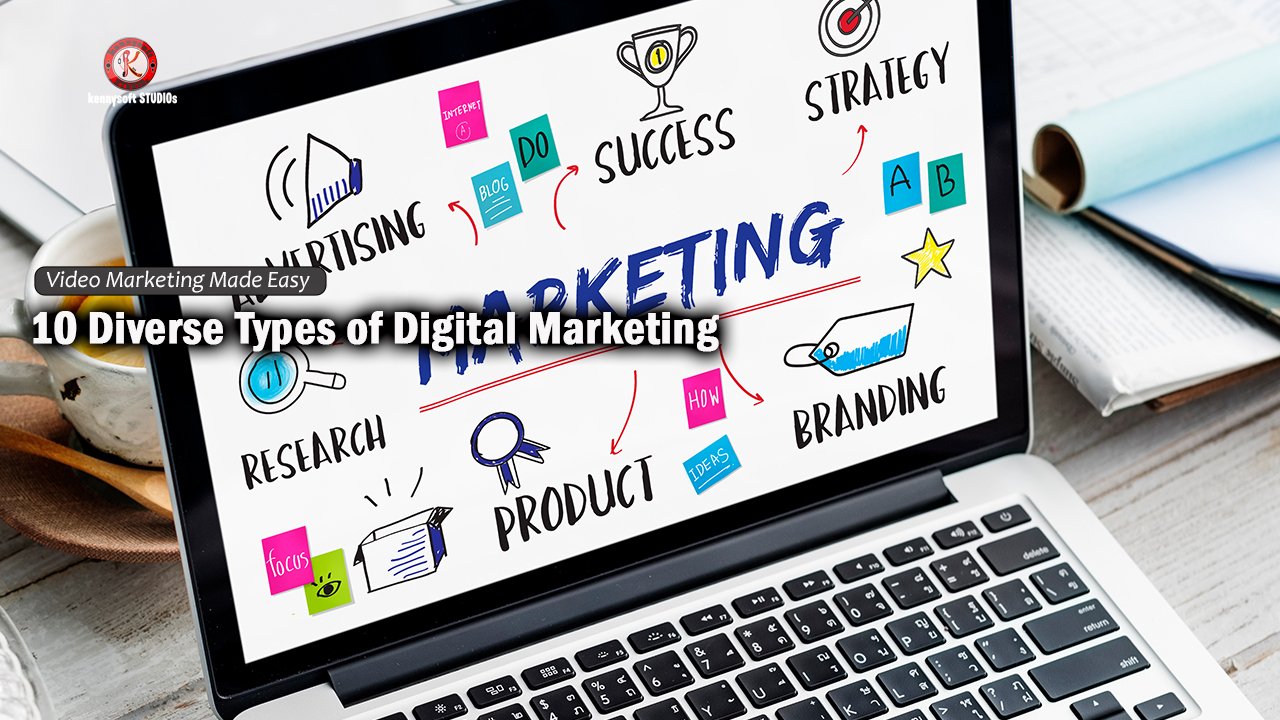Digital marketing encompasses a wide range of strategies and tactics used to promote products, services, or brands through digital channels. As technology evolves and consumer behaviours shift, the prospect of digital marketing continues to expand and diversify. This article explores various types of digital marketing, their key features, and their roles in modern marketing strategies.
Different Types of Digital Marketing
1. Search Engine Optimization (SEO)
SEO focuses on improving a website’s visibility in organic (non-paid) search engine results. The key features include:
- On-page optimization: Optimizing content, meta tags, and site structure
- Off-page optimization: Building high-quality backlinks and improving online reputation
- Technical SEO: Enhancing site speed, mobile-friendliness, and crawlability
SEO is crucial for long-term online visibility and credibility, helping businesses attract targeted traffic without ongoing advertising costs.
2. Pay-Per-Click Advertising (PPC)
PPC involves placing ads on search engines or other platforms and paying each time a user clicks on the ad. Popular forms include:
- Search ads: Text-based ads appearing in search engine results
- Display ads: Visual ads shown on websites within an advertising network
- Social media ads: Paid promotions on platforms like Facebook, Instagram, and LinkedIn
PPC offers immediate visibility and precise targeting options, making it effective for short-term campaigns and performance marketing.
3. Social Media Marketing
Social media marketing involves using social media platforms like Facebook, Instagram, Twitter, LinkedIn, and TikTok to promote products or services. It’s a powerful way to engage with audiences, build brand loyalty, and drive website traffic. Effective social media strategy includes:
- Content Creation: Developing engaging and relevant content that resonates with the target audience.
- Influencer Marketing: Collaborating with influencers to reach a broader audience and build credibility.
- Paid Advertising: Utilizing paid ads to boost content reach and target specific demographics.
Social media marketing aids brand awareness, customer engagement and viral potential
4. Email Marketing
Email marketing involves sending targeted messages to subscribers to nurture relationships and drive conversions. Key areas include:
- List building and segmentation
- Personalization and automation
- A/B testing and optimization
- Compliance with regulations like GDPR and CAN-SPAM
Email marketing remains one of the most cost-effective digital marketing channels, offering high ROI and direct communication with interested audiences.
5. Affiliate Marketing
In affiliate marketing, businesses partner with individuals or other companies (affiliates) who promote their products for a commission. This includes:
- Influencer partnerships
- Referral programs
- Performance-based advertising networks
Affiliate marketing can expand reach and drive sales through trusted recommendations.
6. Mobile Marketing
Mobile marketing targets users on mobile devices, such as smartphones and tablets, through various channels, including SMS, mobile apps, and mobile websites. It focuses on reaching audiences on the go and delivering personalized experiences. Some mobile marketing techniques include:
- Responsive Design: Ensuring websites and emails are mobile-friendly and provide a seamless experience.
- Mobile Apps: Developing mobile apps to engage users and provide value-added services.
- SMS Marketing: Sending targeted SMS messages with promotions, updates, or alerts.
Mobile marketing enables widespread reach, location-based targeting and instant communication.
7. Content Marketing
Content marketing focuses on creating and distributing valuable, relevant, and consistent content to attract and retain a clearly defined audience. It aims to drive profitable customer action by providing value through informative and engaging content. Content includes:
- Blog Posts: Informative articles that provide insights, tips, and solutions to audience problems.
- Videos: Engaging video content that captures attention and conveys messages effectively.
- Infographics: Visual representations of information that simplify complex concepts.
Content marketing enables increased engagement, improved SEO and authority building.
8. Voice Search Optimization
As voice-activated devices become more common, optimizing for voice search is increasingly important. This involves:
- Focusing on conversational keywords and phrases
- Optimizing for local searches and “near me” queries
- Structuring content to answer specific questions
Voice search optimization helps businesses stay ahead of changing search behaviours and maintain visibility across devices.
9. Augmented Reality (AR) and Virtual Reality (VR) Marketing
AR and VR technologies offer immersive experiences for consumers, including:
- Virtual product try-ons
- Interactive 3D ads
- Immersive brand experiences
While still emerging, AR and VR marketing can create memorable interactions and differentiate brands in competitive markets.
10. Influencer Marketing
Influencer marketing involves collaborating with influencers (individuals with a significant online following) to promote products or services. It leverages the influencer’s credibility and reach to build brand awareness and trust. Influencer strategies include:
- Identifying the Right Influencers: Selecting influencers whose audience aligns with the brand’s target market.
- Building Relationships: Developing strong relationships with influencers to ensure authentic and long-term partnerships.
- Measuring Impact: Analysing campaign performance metrics to assess the impact of influencer collaborations.
Influencer marketing enables authentic promotion, increased credibility and access to niche audiences.
Conclusion
Digital marketing offers diverse strategies to reach and engage target audiences. Successful digital marketing often involves integrating multiple types of digital marketing to create a cohesive and effective online presence. As technology continues to emerge, marketers must stay informed about new trends and adapt their strategies to meet changing consumer behaviours and expectations.
